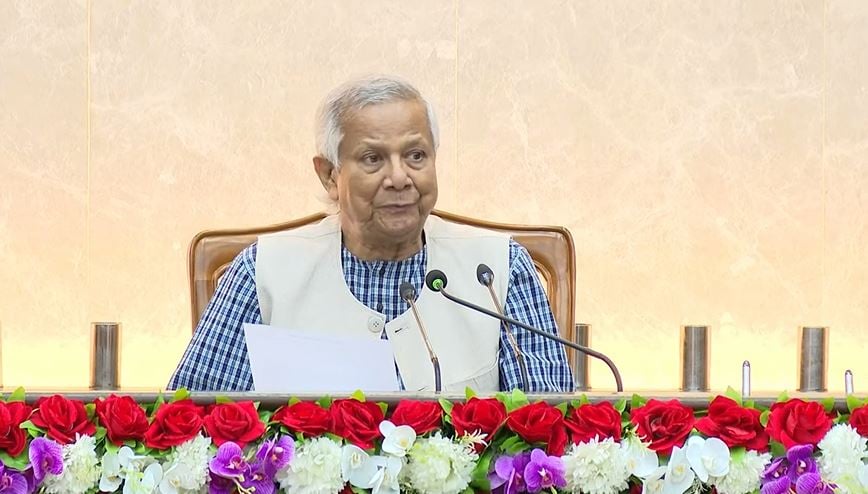News Flash
News Flash

DHAKA, Aug 20, 2025 (BSS) - Chief Adviser Professor Muhammad Yunus today said the "Joint Declaration" signed on the prevention and control of non-communicable diseases (NCDs) will be a new milestone for health protection as it will help achieve the health-related Sustainable Development Goals (SDSs).
"By signing this 'Joint Declaration' today, we have renewed our commitment to work together in national health protection. This should not be limited to just one event. This is our collective effort," he said while speaking at the joint declaration signing ceremony at his office here.
The chief adviser said he believes that through its implementation, public health protection programmes in Bangladesh will be more dynamic and this will be a new milestone of progress.
"It will be helpful in achieving the health-related Sustainable Development Goals and post-SDG development agendas more efficiently," he added.
Prof Yunus said the NCDs are spreading worldwide day by day, while this situation is even more critical in Bangladesh in the context of its socioeconomic, geographical location and the larger population living in a small territory.
"So, it is perhaps the most important aspect of national health management, which is closely related not only to the health sector, but also to our overall economy, social security and sustainable development," he said.
Citing the World Health Organization's 2022 report, the chief adviser said about 71 percent of all deaths occurs in Bangladesh due to NCDs, and 51 percent of these deaths occur before the age of 70, which are considered as premature deaths.
"Our personal medical expenditure (out-of-pocket expenditure) is 69 percent, most of which is spent on non-communicable diseases," he added.
Prof Yunus said people are forced to face high medical expenses when they suffer from NCDs and in many cases, they become helpless.
"In some cases, it is also necessary to seek treatment from abroad at very high costs. A huge amount of our money goes abroad to meet medical expenses of all these diseases," he said.
He stressed creating public awareness on the NCDs and taking prevention and control measures apart from improving the treatment management of NCDs.
It is not possible for the Health Services Division alone, the chief adviser said, adding that cooperation from all ministries is required to this end.
"Each sector such as food, agriculture, education, sports, local government, public works has an important role to play. Specific action plans and intensive initiatives are needed from each sector," he said.
So, he said all these ministries have been identified and their tasks have been determined.
Stressing the need for making the country's people aware of public health, Prof Yunus said if the young people are not made aware of tobacco today, the future of the next generation will be uncertain.
In addition, he said the people should be made conscious about sugar intake on an urgent basis.
He said the national policies must be formulated in such a way that they are health-friendly and helpful in preventing and controlling NCDs, while children, adolescent and women's health must be given special priority.
The chief adviser said widespread public awareness and adoption of health-friendly policies and strategies at all levels can be a great tool in preventing and controlling NCDs.
He suggested taking initiatives to establish healthy lifestyles and responsible civic behavior, and turning it into a social movement.
Prof Yunus said the implementation of the joint declaration requires private initiatives along with the government and regional and global technical cooperation.
"I believe that if the initiatives are taken in this regard by applying the public-private partnership model, the joint declaration implementation will be easier. I hope that the Health Services Division will take initiatives in this regard. The signatory ministries will cooperate. The World Health Organization will provide the necessary support," he said.
The chief adviser said intensive monitoring and evaluation are essential for the implementation of any action plan and these require appropriate and skilled manpower and financial allocation too.
He underscored the need for giving special priority to the implementation of the joint declaration and ensuring the necessary allocation and manpower to this end.
Earlier, Prof Yunus handed over the joint declaration to the senior secretaries.
Senior secretaries and secretaries of 35 ministries signed the joint declaration on the NCDs.
Health and Family Welfare Adviser Nurjahan Begum, Special Assistant on the Ministry of Health and Family Welfare Professor Dr Md Sayedur Rahman, Health Services Division Secretary Md Saidur Rahman and WHO Director (Programme Management) for South-East Asia Region Dr Thaksaphon Thamarangsi also spoke.
Advisers, the cabinet secretary, the chief adviser's principal secretary, senior secretaries, secretaries, senior government officials and representatives from development partners were present at the event.